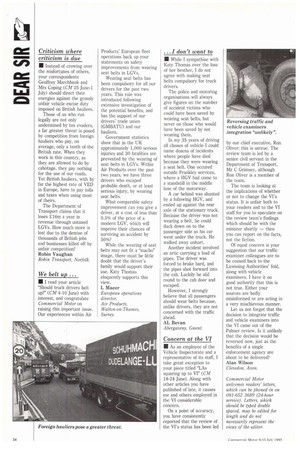Criticism where criticism is due
Page 36

If you've noticed an error in this article please click here to report it so we can fix it.
• Instead of crowing over the misfortunes of others, your correspondents Geoffrey Marchbank and Mrs Coping (CM 25 June-1 July) should direct their energies against the grossly unfair vehicle excise duty imposed on British hauliers.
Those of us who run legally are not only undermined by tax evaders, a far greater threat is posed by competition from foreign hauliers who pay, on average, only a tenth of the British rate. When they work in this country, as they are allowed to do by cabotage, they pay nothing for the use of our roads. Yet British hauliers, with by far the highest rate of VED in Europe, have to pay tolls and taxes when using most of theirs.
The Department of Transport claims that it loses £16m a year in revenue through untaxed LGVs. How much more is lost due to the demise of thousands of British jobs and businesses killed off by unfair competition?
Robin Vaughan Robin Transport, Norfolk.
We belt up ...
• I read your article "Should truck drivers belt up?" (CM 4-10 June) with interest, and congratulate Commercial Motor on raising this important issue. Our experiences within Air
Products' European fleet operations back up your statements on safety improvements from wearing seat belts in LGVs.
Wearing seat belts has been compulsory for all our drivers for the past two years. This rule was introduced following extensive investigation of the potential benefits, and has the support of our drivers' trade union (GIVIBATU) and our hauliers.
Government statistics show that in the UK approximately 1,000 serious injuries and 30 fatalities are prevented by the wearing of Seat belts in LGVs. Within Air Products over the past two years, we have three drivers who escaped probable death, or at least serious injury, by wearing seat belts.
What comparable safety improvement can you give a driver, at a cost of less than 0.5% of the price of a modern LGV, which will improve their chances of surviving an accident by 50%?
While the wearing of seat belts may not fit a "macho" image, there must be little doubt that the driver's family would support their use. Katy Thomas eloquently supports this view.
L Maeer European operations director, Air Products, Walton-on-Thames, Surrey. • While I sympathise with Katy Thomas over the loss of her brother, I do not agree with making seat belts compulsory for truck drivers.
The police and motoring organisations will always give figures on the number of accident victims who could have been saved by wearing seat belts, but never on those who would have been saved by not wearing them.
In my 35 years of driving all classes of vehicle I could name dozens of incidents where people have died because they were wearing a seat belt. One occured outside Frankley services, where a HGV had come to a standstill in the middle lane of the motorway.
A car behind was shunted by a following HGV, and ended up against the rear axle of the stationary truck. Because the driver was not wearing a belt, he could duck down on to the passenger side as his car went under the truck. He walked away unhurt.
Another incident involved an artic carrying a load of pipes. The driver was forced to brake hard, and the pipes shot forward into the cab. Luckily he slid round to the cab door and escaped.
However, I strongly believe that all passengers should wear belts because, unlike drivers, they are not concerned with the traffic ahead.
AL Bevan Abergaveny, Gwent.
Concern at the VI
• As an employee of the Vehicle Inspectorate and a representative of its staff, I take great exception to your piece titled "LAs squaring up to VI" (CM 18-24 June). Along with other articles you have published of late, it causes me and others employed in the VI considerable concern.
On a point of accuracy, you have consistently reported that the review of the VI's status has been led by our chief executive, Ron Oliver: this is untrue. The review team is led by a senior civil servant in the Department of Transport, Mr C Grimsey, although Ron Oliver is a member of the team.
The team is looking at the implications of whether or not to change the VI's status. It is unfair both to your readers and to the VT staff for you to speculate on the review team's findings which should be with the minister shortly — then you can report on the facts, not the fiction.
Of equal concern is your suggestion that our traffic examiner colleagues are to be coaxed back to the Licensing Authorities' fold, along with vehicle examiners. I have it on good authority that this is not true. Either your sources are badly misinformed or are acting in a very mischievous manner.
Let us not forget that the decision to integrate traffic and vehicle examiners into the VI came out of the Palmer review. Is it unlikely that the decision would be reversed now, just as the benefits of a single enforcement agency are about to be delivered? Alan Wilson Clevedon, Avon.
Commercial Motor welcomes readers' letters, which can be phoned in on 081-652 3689 (24-hour service). Letters, which should be typed double spaced, may be edited for length and do not necessarily represent the views of the editor.












































































